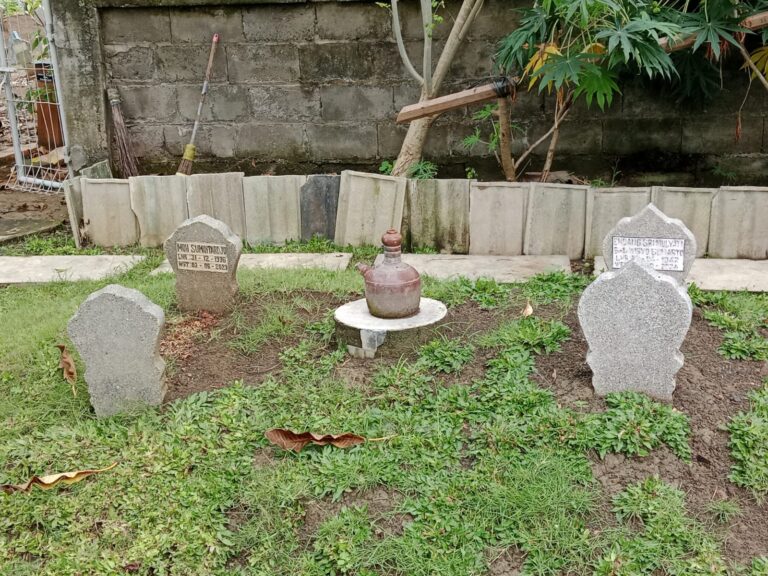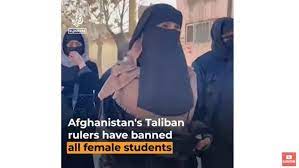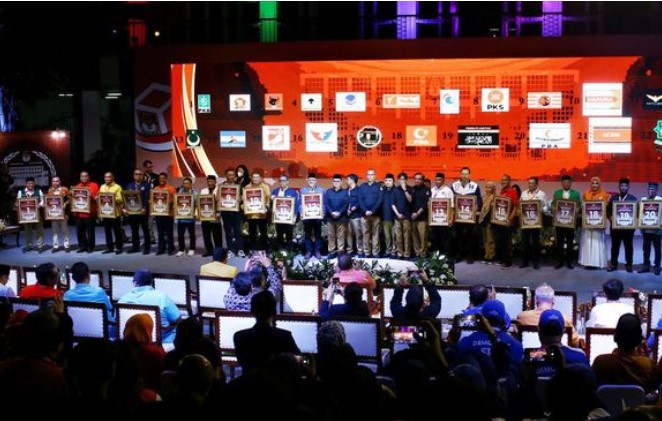
Parpol lolos Pemilu 2024
STRATEGIC ASSESSMENT. Per a survey conducted by the Kompas Research Division, 39.3 percent of respondents indicated their intention to vote for Prabowo, while 16.7 percent for Anies, and 15.3 percent for Ganjar. Gibran is also the most favored running mate.
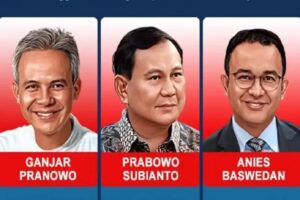
Indonesia’s three presidential hopefuls faced off in the country’s first election debate, with two candidates slamming a court decision that enabled the president’s eldest son to join the leading ticket. In the first of five televised debates ahead of next February’s elections, candidates faced questions on law, governance, human rights and rising corruption in the world’s third-largest democracy.

Prabowo Subanto said that the executive branch has never intervened in judicial matters, specifically concerning the Constitutional Court, responding to a question from Ganjar Pranowo about the court’s decision to permit Gibran Rakabuming Raka, President Jokowi’s son, to run as a vice-presidential candidate, despite not meeting the age requirement.
Indonesian presidential hopeful Ganjar Pranowo faces an uphill battle against rivals ahead of February’s election but is pinning his hopes on an intensive grassroots campaign to boost his prospects. Just two months out from the Feb. 14 poll, opinion surveys show Ganjar, an early favourite, slipping in popularity as defence minister and former general Prabowo Subianto commands a 20-point lead.
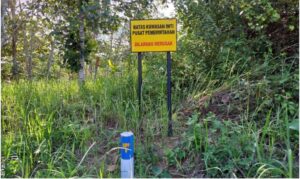
Anies Baswedan said that he will not continue the development of Indonesia’s New Capital Nusantara (IKN) if he is elected. Anies supports resolving ongoing issues in Jakarta, such as traffic jams and population density, before deciding to relocate the capital.
The General Elections Commission (KPU) said that it would recruit 5.7 million local poll administrators (KPPS) for the 2024 election. To help Indonesian citizens living abroad, the KPU plans to recruit 12,765 administrators across 128 countries. These administrators are also Indonesian citizens.

Irman G. Lanti and Adhi Priamarizki, Visiting Senior Fellow and Research Fellow, respectively, at the Indonesia Programme, S. Rajaratnam School of International Studies (RSIS), Nanyang Technological University said after languishing in the polls as a distant third all year round, ex-Jakarta Governor Anies Baswedan’s bid for the Indonesian presidency has caught a second wind among growing concerns about political dynasties and potential election interference by the incumbent president. Protest voters frustrated with the Indonesian political scene has started to flock to Anies, who is now in good position to compete with former Central Java Governor Ganjar Pranowo for second place. Having campaigned as an opposition candidate from the very beginning, Anies is better positioned than Ganjar to fly the opposition flag.
Analysts and online pundits are saying that front runner Prabowo Subianto underperformed and that Anies Baswedan made the biggest impression, showing rhetorical finesse. Ganjar Pranowo scored points by reminding voters of Prabowo’s past human rights controversies.

According to Drone Emprit, a social media analysis firm, “Sentiment towards Anies is 64 percent positive, 27 percent negative sentiment, and nine percent neutral.” According to Muhammad Iqbal, a political observer from the University of Jember, Anies and Ganjar were more argumentative and thus more dominant in the first presidential debate.

Clarifying presidential candidate Anies’ stance on IKN, a spokesperson for the campaign said Anies is not rejecting Nusantara but instead wants to “perfect” the proposal. According to Bestari, Anies will establish four teams for his 100-day program, one of which reportedly involves evaluating the IKN Law.

Defense Minister Prabowo Subianto faced a barrage of attacks regarding human rights issues and a controversial court ruling that allowed him to name the young son of Indonesia’s current president as his running mate, in the first official debate featuring the country’s three presidential candidates. Allegations over Prabowo’s role in the disappearances of pro-democracy activists reemerged during the three-hour event.
Dr Burhanuddin Muhtadi, Visiting Fellow in the Indonesia Studies Programme at ISEAS – Yusof Ishak Institute, and Senior Lecturer at Islamic State University (UIN) Syarif Hidayatullah, and Kennedy Muslim, Senior Researcher and Analyst at Indikator Politik Indonesia who obtained his Bachelor’s degree from Ohio State University and Master’s degree at the Paramadina Graduate School of Political Communication, University of Paramadina. His primary research interest are Indonesian politics, media and technology, and international relations, the decision of the coalition of parties supporting Prabowo Subianto (Gerindra, Golkar, Demokrat, PAN and others) made on October 22 to advance Gibran Rakabuming Raka, the son of President Jokowi, as Prabowo’s running mate is an electoral gamble that has captured much media attention. The dramatic process at the Constitutional Court (Mahkamah Konstitusi or MK), which issued its ruling to pave the way for Gibran to run as a vice-presidential candidate has created controversy.

The MK ruling triggered nationwide criticism on TV and social media, and the Indonesian Democratic Party of Struggle (PDIP) alleged that there was intervention by powerful actors to influence MK’s decision. This storm of criticisms led the Constitutional Court Honorary Assembly (MKMK) to dismiss Anwar Usman, President Jokowi’s brother-in-law, from his position as the Chief Justice of MK.
But from the point of view of Prabowo’s coalition, Gibran is an asset in the upcoming 2024 presidential election. This article addresses the competitive electoral landscape among the three presidential contenders, based on the most recent poll after the MK ruling and the official registration of the Prabowo-Gibran pair at the General Elections Commission (KPU).
Ahmad Syamsudin, Eurasia Review said one presidential candidate dances vigorously despite his age, another flashes a three-finger Hollywood film salute to be hip with the masses, and a third hopeful posts pictures on Instagram of – what else – his cats. In the race to determine who will be the next leader of Southeast Asia’s biggest country, the three candidates are using various tactics to grab attention on social media – all in an attempt to woo young Indonesian voters. These contenders have crafted unique ways of campaigning as they attempt to rebrand themselves to reach Gen Z-ers and millennials, who make up more than half the electorate in the Feb. 14, 2024, national election. Who is Anies Baswedan and how is he positioning his candidacy to expand his supporter base? How can he strengthen his electability moving into the official campaign season? These questions will be addressed in this piece.
The election debates might offer the presidential and vice presidential candidates a chance to sway a sizeable share of undecided voters, analysts say, but the question remains whether they will actually have any significant impact.

Tens of millions of Indonesians watched the three presidential candidates Anies Baswedan , Prabowo Subianto and Ganjar Pranowo went head-to-head in the inaugural debate, presenting their policy stances in a bid to woo voters for a shot at succeeding President Joko “Jokowi” Widodo next year.
Public policy analyst Vishnu Juwono from the University of Indonesia (UI) has called on the General Elections Commission (KPU) to completely overhaul the format for the subsequent sessions of the 2024 election debates.
“The debate format [designed] by the KPU is not conducive to presidential candidates in conveying their visions, missions and opinions,” Vishnu as quoted by Antara News.
Presidential frontrunner Prabowo Subianto has promised to grant amnesty to members of armed and separatist groups to end the conflict in Papua. Prabowo’s campaign spokesperson Munafrizal Mananon said Prabowo plans to use the “soft approach” to address the armed conflict in Papua by communicating with the groups. After that, the presidential candidate, who is also the country’s defense minister, intends to offer amnesty to the armed groups as a way to achieve peace without violence, drawing a comparison to the success of a similar resolution in Aceh.
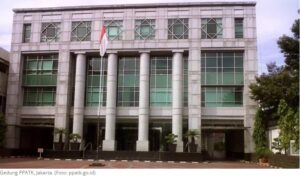
Financial Transaction Reports and Analysis Center (PPATK) Chair Ivan Yustiavandana disclosed that there was an increase in suspicious transactions during the 2024 election campaign period. Trillions of rupiah in transactions were linked to election participants.
Virdika Rizky Utama, researcher at PARA Syndicate and Graduate Student in Political Science at Shanghai Jiao Tong University said Prabowo’s political trajectory is a case study of resilience and reinvention. Throughout his long career he has faced accusations of war crimes, incompetence and even treason – and yet his detractors have never managed to end his political influence. This is due, in part, to Prabowo’s ability to repeatedly adapt his image to reflect Indonesia’s ever-shifting socio-political landscape, playing a range of different roles at different times, from military strongman, to protector of Islamic values, and even global peacemaker. But as the 2024 election approaches, it is his most recent persona – that of an adorable grandpa for Indonesia’s Generation Z and millennial voters – that could be his most savvy. If he can keep the conversation light-hearted, Indonesia’s youngsters might overlook his dark past.
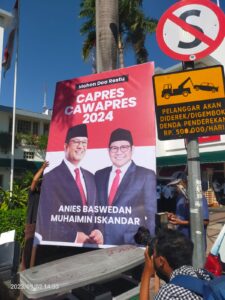
Presidential hopeful Anies Baswedan’s campaign team said he and his running mate Muhaimin Iskandar, if elected, would seek to strengthen corruption eradication efforts by increasing rewards for whistleblowers. Bambang Widjojanto, a member of the Anies-Muhaimin campaign team, also the founder of the Indonesian Legal Aid Institute (YLBHI), said that reforming the whistleblower program was crucial to ensure close monitoring of state officials. Bambang added that the candidate pair had developed several strategies to combat corruption.
Spokesperson for the campaign team of Prabowo Subianto and Gibran Rakabuming Raka, Burhanuddin Abdullah, said their proposed free lunch and milk program was forecast to cost Rp 1 trillion (US$64.46 million) per day and could create new jobs for citizens. Burhanuddin was speaking during an event in Jakarta where volunteers voiced their recommendations to be included in Prabowo-Gibran programs if they win the 2024 presidential election.
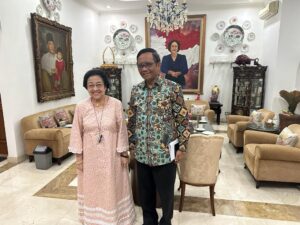
Political, Legal, and Security Affairs Coordinating Minister Mahfud M.D. asked the Election Supervisory Agency (Bawaslu) and the Corruption Eradication Commission (KPK) to investigate alleged irregularities transaction in the 2024 elections. Previously, Financial Transaction Reporting and Analysis Center (PPATK) Chair Ivan Yustiavandana said that transaction reports allegedly related to money laundering in the 2024 election campaign increased 100 percent in the second half of 2023.
Ward Berenschot, Professor of Comparative Political Anthropology at the Unviersity of Amsterdam and Senior Researcher at the Royal Netherlands Institute of Southeast Asian and Caribbean Studies said Indonesia’s upcoming presidential elections will be boring, despite plenty of drama on the surface. In October 2023, Indonesia’s Constitutional Court, headed by President Joko ‘Jokowi’ Widodo’s brother-in-law, ruled that Jokowi’s son Gibran Rakabuming Raka could run for the vice-presidency.
This twist not only undermined trust in the independence of the Court, it also upset the presidential race. Frontrunning candidate Prabowo Subianto was quick to enlist Gibran as his vice-presidential candidate, a savvy move that seems to have succeeded in increasing his lead in the polls over his two rival candidates Ganjar Pranowo and Anies Baswedan. This decision also signalled that Jokowi no longer supports Ganjar, a candidate from his own party. Jokowi has chosen dynasty over party loyalty.
Dr. Leo Suryadinata, Visiting Senior Fellow at ISEAS – Yusof Ishak Institute and Professor (Adj.) at S. Rajaratnam School of International Studies at NTU. He was formerly Director of the Chinese Heritage Centre, NTU said in late October this year, the Student Activities Unit (UKM) at the University of Gadjah Mada (UGM) announced that a “spiritual area” consisting of houses of worship on its campus would be ready soon. A public university, UGM is the alma mater of President Joko “Jokowi” Widodo and the only Indonesian university where houses of worship for various religions (other than Islam) are being established. This is a significant symbol that would show UGM embraces Pancasila and religious pluralism. As Jokowi is known as a Pancasila-ist and is still powerful even near the end of his presidency, one wonders who conceived this project and why it is being completed near the end of Jokowi’s presidency? Was President Jokowi involved?
Jacqui Baker, Lecturer in Southeast Asian Politics and Senior Fellow at Murdoch University’s Indo-Pacific Research Centre where her research focuses on the political economy of development in Indonesia, with particular attention to issues of inequality, security and law said in 2023, as the second term of Joko Widodo (Jokowi) concludes and the 2024 election looms, elements of his ruling coalition have renewed strategies of accommodation, co-optation, legal challenge, repression, and coercion to restrict the prospects of open political contestation. Examined in totality, these tactics directly target the core institutional and political wins of Indonesia’s reformasi movement: regular elections, human rights, rule of law and judicial activism, regional autonomy and anti-corruption. The inability of oppositional and protest movements to resurrect and rebuild a national coalition to curtail the elite rollback of reformasi indicates that they are exhausted as a salient political force.
The Indonesian Democratic Party of Struggle (PDI-P) is changing its tune on its tough rhetoric against prominent member President Jokowi after the nation’s largest party’s popularity took a dip and was overtaken by a rival camp that has cast itself as the champion of continuity.
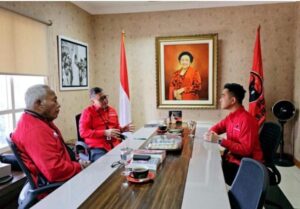
Since Jokowi let his son Gibran Rakabuming Raka run on the PDI-P rival’s ticket as running mate to frontrunner Prabowo Subianto, the party has gone on the offensive against the wildly popular outgoing President.

The PDI-P, however, now appears to be singing a different tune as it painted Jokowi’s perceived politically charged work visit to Central Java as the President’s way of still supporting his fellow party member and presidential candidate Ganjar Pranowo, who is a former governor of the province.
At the Social Forestry Community Movement (Gema PS) volunteer declaration event in Blitar City, Sunday afternoon, presidential candidate number 2 Prabowo Subianto reminded his supporters to be good at choosing future leaders in the country. If there are people who offer “supporters” money, Prabowo encourages them to accept it. Even so, Prabowo asked his supporters to still vote for a candidate for leader according to their consciences.
Regarding his decision to pick President Jokowi’s eldest son as his VP candidate, Prabowo recalled his election debate exchange with Anies Baswedan, imitating his rival: “How do you feel, Mas Prabowo, about ethics?” “Ethics, ethics, ndasmu ethics,” Prabowo continued, to clapping and cheering from his supporters.
Allegations have emerged of illicit money flowing into campaigns for the 2024 general election, after the Financial Transaction Reports and Analysis Center (PPATK) recently flagged an abnormally high number of suspicious transactions ahead of the February 2024 polls. The suspicions, if proven, could spell trouble for the integrity of next year’s elections — and even implicate a frontrunner — piling pressure on the authorities to properly investigate.
Mr. Made Supriatma, Visiting Fellow in the Indonesia Studies Programme at the ISEAS – Yusof Ishak Institute said Indonesia’s 2024 election campaign is now at a pivotal stage: a series of five televised debates among the contenders. Until a week before the first round took place on 12 December, there was still confusion surrounding the debate format and rules. This confusion was primarily whether there would be a clear distinction between debates featuring the presidential candidates (three rounds) vis-à-vis the vice presidential (VP) candidates (two rounds). An initial suggestion that the two VP debates might be done away with raised concerns and sparked allegations that the General Election Commission (KPU) was favouring Gibran Rakabuming Raka – President Joko Widodo’s (Jokowi) son and frontrunner Prabowo Subianto’s vice-presidential candidate. Gibran is not expected to be a strong debater against his more experienced competitors, Mahfud MD (Ganjar Pranowo’s running mate) and Muhaimin Iskandar (Anies Baswedan’s running mate).
Prabowo Subianto, one of Indonesia’s three presidential candidates, has promised to provide free lunch for all schoolchildren, among other pledges, if he is elected to the top office on Feb. 14, 2024. One of his rivals, the ruling party’s Ganjar Pranowo, has said he would review a contentious job creation law that was pushed by current President Joko “Jokowi” Widodo, while pledging to maintain many of the outgoing leader’s policies.
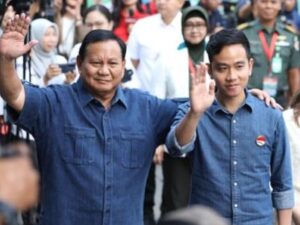
Meanwhile, the third contender, ex-Jakarta Gov. Anies Baswedan, has promised to shelve Jokowi’s U.S. $33 billion legacy project to build a new capital city and focus instead on alleviating poverty and inequality.
While the focus of the Indonesian presidential race has largely been on predicting potential runoff contenders, all three campaigns are now under scrutiny for alleged violations, just four weeks into the official campaign period.
Recent polls indicate that presidential candidate Prabowo Subianto and his running mate Gibran Rakabuming Raka are the frontrunners for the February 2024 election
Meanwhile, rivals Ganjar Pranowo and Mahfud MD, as well as Anies Baswedan and Muhaimin Iskandar, are engaged in a closely contested battle for a spot in a potential runoff.
The transactions amount to tens of millions of dollars and implicate thousands of people from “all political parties”, said the head of Indonesia’s financial intelligence government agency. President Jokowi instructed law enforcement agencies to follow up on the findings of the Financial Transaction Reports and Analysis Center (PPATK) regarding illegal campaign funds, emphasizing that all parties involved in the 2024 election should follow regulations.
Activists have slammed vice presidential candidate Mahfud M.D., calling him sexist and misogynistic, after he suggested that the wives of graft convicts were to blame for their husbands’ offenses. Mahfud, who is running alongside presidential candidate Ganjar Pranowo for the ruling Indonesian Democratic Party of Struggle (PDI-P), told a group of women in Padang, West Sumatra that wives put pressure on their husbands to live beyond their means, causing the men to resort to corrupt actions.
Endy Bayuni, The Jakarta Post said all eyes will be on Surakarta mayor Gibran Rakabuming Raka when he takes the stage on Friday night in the first debate pitting all the three vice presidential candidates. Forget Muhaminin Iskandar and Mahfud MD, even though both are far more senior and seasoned politicians.
If they win with their partners in the February presidential election, they will likely become ceremonial VPs, just like every past VP. But Gibran goes down in Indonesian election history as the most consequential running mate, ever,
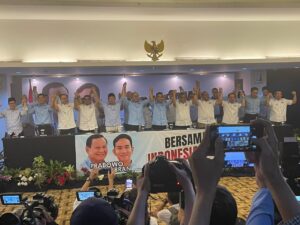
Gibran is different for many reasons. If he wins the election as running mate to Prabowo Subianto, he will be more than a “spare tire”, a description that Indonesians like to give to all vice presidents in the past for their role as nothing more than a reserve to support the president.
However, Prabowo and Gibran themselves face accusations of campaign violations, as evidenced by the General Elections Commission (KPU) reprimanding Gibran for his conduct during last week’s inaugural presidential debate.



